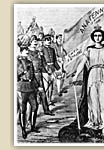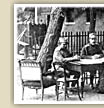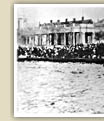 |
 |
 |
 |
 |
 |
 |
 |
 |
 |
|
During the period 1897-1922 very important events and headlong developments
determine the evolution of Greece and decisively contribute to its formation
as a modern state.
|

It is a period of spectacular changes, critical choices, acute crises, a
ten year war adventure, which ends up in the territorial expansion of Greece on the
one hand and the dramatic termination of the Asia Minor Campaign on the other hand and aims at the
formation of a state radically different from that of the past.
The period begins with an event-landmark: the defeat in the Greco-Turkish
war of 1897. The defeat has been perceived as a huge blow, causing universal
disappointment apart from putting the state and its mechanism structures,
the traditional political world and the royal dynasty as concerns their efficiency
in managing national issues under doubt. The defeatist attitude and the sense
of "shame" were intensified even more by the establishment of the International Financial Control
Commission, that would oversee the payment of a war indemnity to Turkey, as well as settle the overall
external debts, being the result of the state's bankruptcy in 1893. The economic and national crisis,
that is a double failure, both in the economic sector and the policy of irredentism breed
a climate of disillusionment and introspection. By 1909 there is no change whatsoever. Two parties
alternate in power: the Trikoupist party headed by Georgios Theotokis and the
Deliyannist party with Theodoros Deliyannis himself as leader and, after
his assassination in 1905, his successors, Dimitrios Rallis and Kyriakoulis
Mavromikhalis, leaders of two different parties, originating though from the
Deliyannist party. No particular progress has been made apart from some efforts by the governments
of Theotokis, in the economic sector in particular, for recovery. On the contrary,
the towering economic crisis and the plight of various social groups, the continuous
disclosure of the weaknesses of the old political status cause an increasing
discontent and breed the conditions for the development of reaction.
|
 |

1909, the year that the Military coup of Goudi broke out, is taken as
a starting point for the division of Greek history marking the beginning
of a ten-year period (1910-20) of progress and shaping of Greece as
a modern state. It coincides with the rise of the middle bourgeois class,
which, reinforced by the economic development of the last years of the
nineteenth century, claim from the old political bourgeois oligarchy
their political representation and the creation of those instutional preconditions that
would facilitate their economic activity.
The Cretan statesman Eleftherios Venizelos will emerge as a leading figure,
who will represent the attempt at transforming the Greek society into a capitalist one
and organizing the state after the models of western republics.
The urban modernization attempted by Venizelos will go hand in hand in perfect harmony with
national integration, under the form of irredentism and the incorporation of the New Territories and their
inhabitants in the national state. These two objectives, economic and political modernization
on the one hand and the militant pursuit of the Great Idea in the conjuncture of circumstances of the First World
War on the other hand, constitute the essence of Venizelism.
Reaction to both urban modernization and irredentism gave birth to anti-Venizelism.
The overall social and political contrast among both various social groups and old and new populations, incorporated with
the territorial expansion being the result of the victories reaped during the Balkan wars,
will be personified in the conflict between the prime-minister Eleftherios Venizelos
and King Constantine I about the stance of Greece in the First World War.
It will acquire the dimensions of a National Schism, that culminated in the period
1915-17 with the creation of two Greek states, an anti-Venizelist one in the territory of Old Greece
and a Venizelist one in the area of the New Territories.
In the period 1917-20, during the second phase of Venizelist rule,
the modernizing effort is kept on that has been inaugurated in the period
1910-15 and has been checked by the developments of the Schism and war.
|
 |

In the 1920 elections, while the Asia Minor Campaign was under way,
the Greeks worn out by the ten-year war venture voted against the Liberals. The anti-Venizelists
despite their pre-election promises, pursued the Asia Minor war, reinstating to the throne the
undesirable to the Western allies King Constantine I. This fact served the allies as a pretext
to forsake Greece in Asia Minor, since their interests dictated by now
the support of Kemal. During this period developments in the domain of foreign policy
are dominant. Within the different by now international correlation of powers,
that would annul Greek aspirations in Asia Minor, wrong military choices and economic exhaustion
brought about an even more painful Catastrophe in the summer of 1922, uprooting
the Greek populations of the East from their homelands and turning them into refugees
in Greece.
After the debacle of the front Greece is in a tragic plight.
Crowds of refugees and soldiers throng the country. A group of officers
headed by Nikolaos Plastiras takes over power,
pursuing chiefly a purge for the national tragedy. This is the
"Revolution of 1922". Within this context the Trial of the
Six ringleaders of the Catastrophe took place, that led to their death sentence,
a fact that exacerbated the heavy climate of the time.
|
 |
 |
